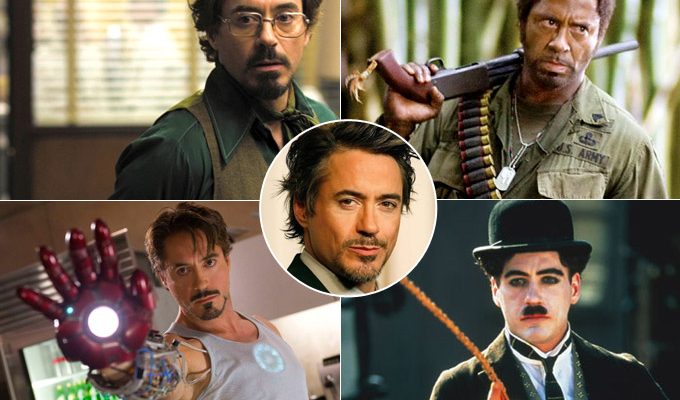 “U.S. Marshals” (1998)
“U.S. Marshals” (1998)
Well we did say not all the films we chose as milestones were going to be highlights, didn’t we? Really we could have gone with any number of entries from this period of Downey Jr.’s career, which we’re going to dub the “wilderness years,” but the best quotes from the man himself are about this one. A Harrison Ford-less sequel to “The Fugitive,” the film lacks all of the original’s inventiveness and dynamism and it’s one of the rare occasions where you can’t even say Downey Jr.’s presence elevates proceedings much. Wesley Snipes feels miscast in what should be a sympathetic everyman role, and Tommy Lee Jones‘ character, which had won him the Supporting Actor Oscar before, was too much of a gruff-but-decent open book for the action to have much in the way of stakes.
But as lackluster as we think the film is, we probably wouldn’t go so far as Downey Jr. who dubbed it: “Possibly the worst action movie of all time… I’d rather wake up in jail for a TB test than have to wake up another morning knowing I’m going to the set of ‘U.S. Marshals.'” To us it’s simply one more in a string of more-or-less uninspired second or third leads he played around this time from the aforementioned “Danger Zone” to “The Gingerbread Man” to “One Night Stand” to “Hugo Pool” (directed by Downey Sr.) to “Black and White.”
It was also a period that coincided with his most public and disastrous arrests — indeed he needed a special dispensation to be able to complete filming on the similarly crap Neil Jordan horror “In Dreams” prior to being committed on a three-year sentence to a substance abuse center (he’d serve one). It would appear that the drug habit that he had for so long maintained without any noticeably detrimental effect on his acting abilities, was starting to take its toll.
 “Wonder Boys” (2000)
“Wonder Boys” (2000)
Exactly how and when Downey Jr.’s personal recovery really started we can’t guess, and of course our chronology will be a bit out of whack due to the vagaries of shoot times and release dates, but safe to say that by the time that first string of arrests and relapses and, most importantly, stale, insipid movies had run its course, certain damage had been done to his ability to win over an audience. His career rehabilitation started, to our minds, with his role in “Wonder Boys,” Curtis Hanson‘s adaptation of the beloved Michael Chabon novel.
Again, Downey Jr. is the third lead, technically taking a backseat to Michael Douglas and Tobey Maguire. But his Terry Crabtree, the publisher of Grady Tripp’s (Douglas) constantly postponed book who needs a hit almost as much as Grady does but falls for James (Maguire) while in town, is a terrific turn, full of the almost-trademark jaded humanism that his recent performances had been sorely lacking. It was a role that reminded us all over again that Downey Jr., as he said of his character “can pretty much drink and take pills and smoke pot and make huge mistakes, and in the midst of all, he still has this genuine talent.”
Sometime around then too, Downey Jr. landed a recurring role on TV with “Ally McBeal.” Despite the actor’s own protestations that his performance was overrated, and his relapse and re-arrest leading to his dismissal from the show, he was nominated for an Emmy and widely credited with the ailing show’s suddenly improved ratings. So for the next few years, Downey Jr. found himself in the unenviably ironic position of being an actor everyone wanted to see more of, but no one could hire, unless, like Mel Gibson on the folly that became “The Singing Detective,” they were willing to insure him themselves. Woody Allen reportedly wanted him (and fellow “jailbird” Winona Ryder) for 2005’s “Melinda and Melinda” but couldn’t get bonded for either. Trust superproducer Joel Silver to find a way around it though. Casting Downey Jr. in the compellingly terrible Halle Berry vehicle “Gothika,” he hit on a scheme that became standard for RDJ contracts for the following years: he withheld a large percentage of the actor’s salary as his own insurance policy for completion. And if his performance, and the film in general didn’t impress, well, anyone else, it impressed Silver, and led to much better things in the shape of…
 “Kiss Kiss Bang Bang” (2005)
“Kiss Kiss Bang Bang” (2005)
Notable not just for being Downey Jr.’s first go-round with writer/director Shane Black, who landed the “Iron Man 3” gig, “Kiss Kiss Bang Bang” is actually a kind of redemptive film for almost everyone concerned. Once famously the highest paid screenwriter in Hollywood, Black (“Lethal Weapon,” “The Last Action Hero,” “The Long Kiss Goodnight“) had lost some of that gloss prior to making this, his directorial debut. Co-lead Val Kilmer had been languishing in B-movie purgatory for nearly a decade (and in fairness, he kind of went straight back there afterwards) and Downey Jr. hadn’t had a critical hit since “Wonder Boys.”
The film inexplicably failed to find much of an audience on release, but it’s a terrifically fun, dark, self-reflexive deconstruction of the comedy/crime/cop/caper genre that Black had helped pioneer. In it, actor and unreliable narrator Harry (Robert Downey Jr.) is studying and shadowing cop Gay Perry (Kilmer) for a role when he gets embroiled in a deranged, twisty and very funny murder and mayhem plot. It was a gift of a role for Downey Jr., defining that self-aware, arch, witty persona he does so well, whose bravado masks a wide, endearing streak of self-doubt. In fact watching the film now feels a lot like seeing someone come home: as good as RDJ has been in various performances throughout his career, this role fit him like a glove, so much so that it’s the kind of persona that has conflated irresistibly with the real-life guy.

